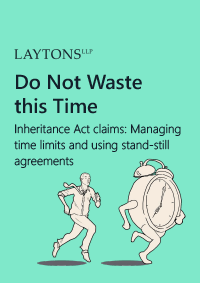Trusts, Estates & Private Client | Estate Administration
Administering estates forms an inherent part of our practice. When an individual dies, we work closely with the executors to ensure the estate is administered efficiently, either in accordance with the terms of the will or, if the individual has not made a will or there is no valid will, in accordance with the intestacy rules.
We guide executors and family members through what can often be a complex process and are able to offer comprehensive advice on post death restructuring including deeds of variations and appointments under discretionary will trusts.
We recognise that individuals are increasingly likely to own assets in multiple jurisdictions; we are able to deal with assets across different jurisdictions and liaise with foreign lawyers when dealing with international estates. Where individuals who are not domiciled in the UK die owning assets in the UK, we can help by either obtaining a UK grant of probate or resealing a grant that has already been obtained.
Related Expertise
Our Team
News & Insights
In the recent Upper Tier Tax Tribunal (UT) decision in Elborne v HMRC [2025] UKUT 00059 (TCC), the UT set aside the First Tier Tax Tribunal’s (FTT) decision in favour of HMRC to declare the ‘home loan’ tax avoidance scheme a success.
Until the 6th April 2025, the UK’s taxation of individuals who were non-doms was based on the concept of domicile, a legal term under English law referring to a person’s long-term permanent home. Non-doms could live in the UK while enjoying favourable tax treatment under the “remittance basis”. This treatment typically lasted for up to 15 years.
On 7th August of last year we discussed the upcoming changes to the VAT position for Independent Schools. Now we are in the New Year, what can we say about the implementation of these changes?
The Autumn 2024 budget (“the Budget”) was publicly announced on 30 October 2024 and whilst it has brought some significant changes, there are many policies that remain the same and some anticipated reforms which were overlooked.
Since 2017, Labour has consistently discussed their desire to scrap the value added tax (VAT) exemption for private school fees. It has been a topic included in manifestos, statements and during the General Election campaign. When asked, Sir Keir Starmer confirmed he wished to scrap the tax benefit “as soon as it can be done”. Now Labour is in office what does this mean.?
We understand that dealing with your family affairs requires more than just sound advice and technical excellence. We invest the time to get to know our clients’ circumstances, needs and preferences to deliver commercially informed and practical results for you.
The Inheritance (Provision for Families and Dependants) Act 1975 (“the Inheritance Act”) enables some limited exceptions to the principle of testamentary freedom and provides an option for redress for those dissatisfied with the dispositions made to them in a will.
It is surprising to note that despite society’s increased reliance upon and use of the internet, the law too seems to be lagging behind when it comes to making provisions for the transfer of digital assets upon death.
A key benefit of a family charter is that it can create processes to record agreements on issues specific to the family that simply could not be dealt with in the company’s articles of association or shareholders’ agreement.

















